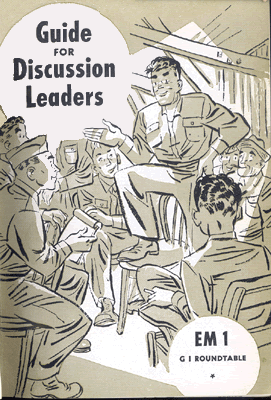By Donald W. Goodrich
Major, U.S. Army Morale Services Division
(Published September 1944)
 Table of Contents
Table of Contents
Why Discussion Groups in the Army?
Group Discussion in Isolated Units
Why Discussion Groups in the Army?
 Ours is an Army of citizens trained in democratic ways. It is made up of men educated at public schools and universities, experienced in business and professional life, accustomed to reading newspapers and magazines and to drawing out books from public libraries. They have listened to radio commentators, attended and taken part in forums, signed petitions, and joined causes. They are American citizens who are used to asking questions and to holding opinions about everything that touches their lives.
Ours is an Army of citizens trained in democratic ways. It is made up of men educated at public schools and universities, experienced in business and professional life, accustomed to reading newspapers and magazines and to drawing out books from public libraries. They have listened to radio commentators, attended and taken part in forums, signed petitions, and joined causes. They are American citizens who are used to asking questions and to holding opinions about everything that touches their lives.
Whether their opinions are well founded or not, they express them freely. To the extent that they do not have facts from which to draw conclusions, their opinions are likely to be un-sound. If they lack facts, their morale may be weakened by uncertainty about the purposes and probable results of the combat for which they are so highly trained.
One of the most effective ways of making it possible for men to get at the facts and to prepare themselves for the problems that await them as citizens after the war is to make it possible for them to take part in informal discussion groups or forums. Such discussions afford a chance to check information and to compare and test out opinions.
This pamphlet tells how to organize discussion groups and forums that will serve this important educational purpose.
The objectives of a discussion program in the Army are:
- To furnish information, not otherwise available to troops, on international, national, community, and personal problems.
- To train men in democratic methods of studying and solving community, national, and international problems.
- To offer men opportunity for orderly exchange and adjustment of individual opinions on public issues of contemporary importance.
- To strengthen morale by assisting men to recognize, analyze, and understand problems that otherwise may trouble and confuse them.
Warning: It is important that all officers who are given or who assume responsibility for organizing or for leading Army discussions interpret the third objective with care. In phrasing this objective the emphasis has been placed deliberately upon individual opinions. It is desired that officially conducted off-duty discussions attempt neither to indoctrinate men with a particular point of view nor to lead them to any type of action such as passing resolutions, initiating petitions, or otherwise crystallizing a group opinion. The purpose of the meetings should be that of offering information and providing opportunity for study. The leader should meet his group with the attitude of an educator, not with that of a propagandist.
Related Resources

September 7, 2024
Travel and Trade in Later Medieval Africa

September 6, 2024
Sacred Cloth: Silk in Medieval Western Europe

September 5, 2024